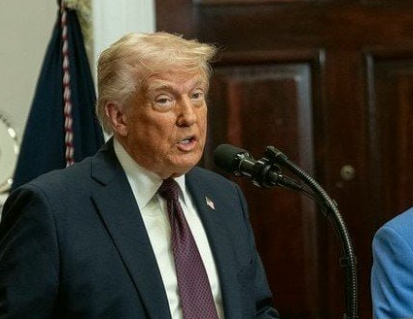

U.S. President Donald Trump's recent call
for free passage of American ships through the Suez Canal has triggered
widespread condemnation in Egypt, where legal experts, political
leaders, and citizens have denounced his remarks as legally groundless
and a serious threat to the international order. On Saturday,
Trump posted on Truth Social, a social media platform he majority-owns,
that U.S. military and commercial vessels should be allowed to travel
through both the Panama Canal and the Suez Canal free of charge.
He claimed both routes would "not exist" without the United States and
said he had asked Secretary of State Marco Rubio to immediately "take
care of, and memorialize, this situation." "Trump's proposals
about international waterways constitute a serious threat to
international peace, security, and public order," Ayman Salama,
professor of international law at Cairo University, told Xinhua on
Monday. Salama highlighted the 1888 Constantinople Convention,
which established the fundamental principles governing international
dealings with the Suez Canal, preserving the right of all countries to
benefit from this global waterway. He said Trump's "legally
baseless" claims, which ignore the sovereignty of coastal states over
their territorial waters and straits, could lead to interference in
countries' internal affairs, a clear violation of the general principle
of non-interference of contemporary international law. Warning
against disruption to international trade and harm to the global economy
by U.S. interference, the Egyptian legal expert urged the international
community to stand firm in defending international laws and conventions
and take serious steps to safeguard the legal bases for navigation.
Meanwhile, Samaa Soliman, deputy chairman of the Foreign, Arab, and
African Affairs Committee of the Egyptian Senate, affirmed on Monday
that "only Egypt is responsible for securing and protecting the Suez
Canal," and the revenues generated from canal transit fees are a
legitimate sovereign resource backing the national economy and serving
Egyptian citizens, and shall not be impaired under any pretext or
justification. The Egyptian senator termed Trump's call as
"unjustified interference in the affairs of a sovereign state, and is
inconsistent with the principle of mutual respect between states."
Soliman said that the Suez Canal and the Egyptian economy have been
harmed by the U.S. as its unfair policies on the Palestinian issue
fueled the region's instability and failed to stop the Houthis in Yemen.
Egypt's revenues from the Suez Canal fell by more than 60 percent
year-on-year in 2024 amid the Red Sea tensions, resulting in a loss of
nearly 7 billion U.S. dollars, according to the Suez Canal Authority
(SCA). Sayed Abdel Aal, president of Egypt's socialist Tagammu
Party, said in a statement on Sunday that "(Trump's) remarks not only
represent provocative rhetoric but also reveal a hateful colonial
mentality." The party leader explained that canal fees are fair
and are determined according to international standards, without
discrimination, adding that the United States cannot impose exceptional
conditions. "Trump's call can only be viewed as economic colonialism in a new garment," he added.
Also on Sunday, the Egyptian Parties Alliance, which includes
approximately 42 political parties, condemned Trump's statement,
criticizing it as "ignoring historical facts." The controversy
has ignited strong reactions on Egyptian social media, particularly
regarding Trump's suggestion that the United States deserves credit for
the canal's existence. "Our grandfathers built the Suez Canal
with their blood when America was engulfed in civil war. We will
continue the course of our ancestors, and Trump will not impose his
conditions on us," read one widely shared post. The canal,
which opened in 1869, has long been the linchpin of global trade,
connecting the Mediterranean and Red Seas. Despite its complex colonial
history under French and British control, the canal has remained a
powerful symbol of national pride for Egyptians, particularly since its
nationalization in 1956 by President Gamal Abdel Nasser, a pivotal
moment in Egypt's modern history.










